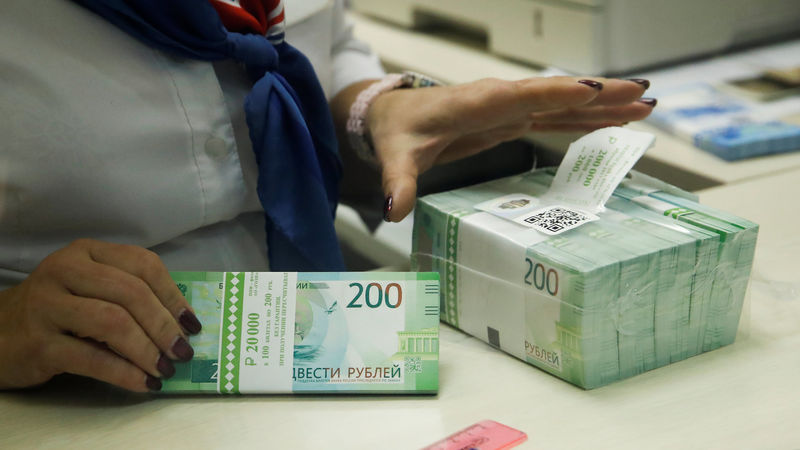Gold prices edge lower; heading for weekly losses ahead of U.S.-Russia talks
By Geoffrey Smith
Investing.com -- The Russian ruble surged again to a new four-year high on Monday, as the weight of foreign inflows generated by its energy exports continued to support the currency.
By 11:06 AM ET (1506 GMT), the dollar was down 4.1% at 57.74 rubles, the lowest since April 2018. It had gone from 62.80 at the start of the year to as high as 121.20 rubles immediately after the invasion of Ukraine. Monday's rally, however, cements the ruble's place as the top-performing major emerging market currency of 2022 so far.
Russia's current account surplus has ballooned this year as the West's efforts to punish the Kremlin for its invasion of Ukraine have put a big geopolitical risk premium on oil and gas. That has allowed the central bank to reverse some of the emergency measures it took to support the ruble immediately after the invasion. It has now cut its key rate to 14% from 20% and has relaxed some of its more marginal capital controls on the banking system.
The latest leg up to the ruble came after fresh evidence that the European Union is struggling to enforce its declared intention of cutting the Kremlin's stream of export revenues. Last week, Italian oil and gas giant Eni (BIT:ENI), one of the biggest clients of gas monopoly Gazprom (MCX:GAZP), said it would comply with a Russian demand to open a bank account in rubles for processing its purchases. That has angered the European Commission, which has said that Russia's actions represent an illegal one-side redrawing of a legally-binding supply contract.
In addition, newswires reported earlier Monday that the EU's efforts to convince its 27 member states to sign up to an embargo on Russian oil by the end of the year are still being held up by resistance from Hungary, whose government has said such a move would wreck its economy. Hungary, like Slovakia, Bulgaria and other central and eastern European countries, is disproportionately dependent on supplies of crude and fuels from a pipeline network built when they were satellite states of the Soviet Union.
EU sanctions packages require unanimous support to come into effect. Offers of temporary exemptions for the likes of Hungary and Slovakia have so far failed to convince the holdouts.
